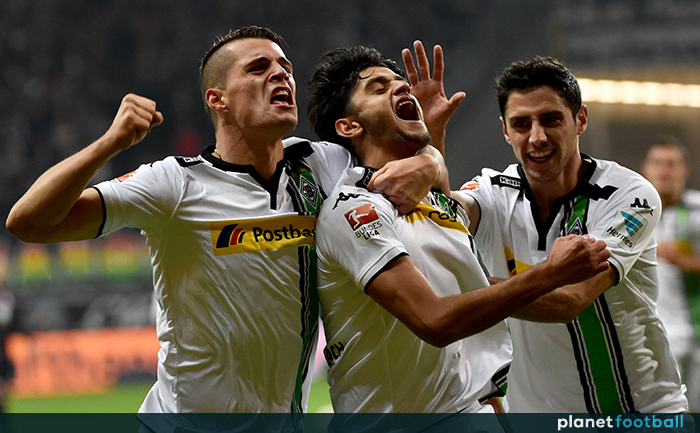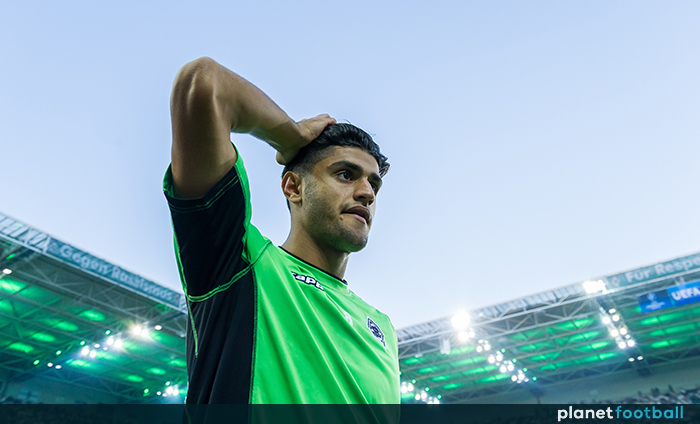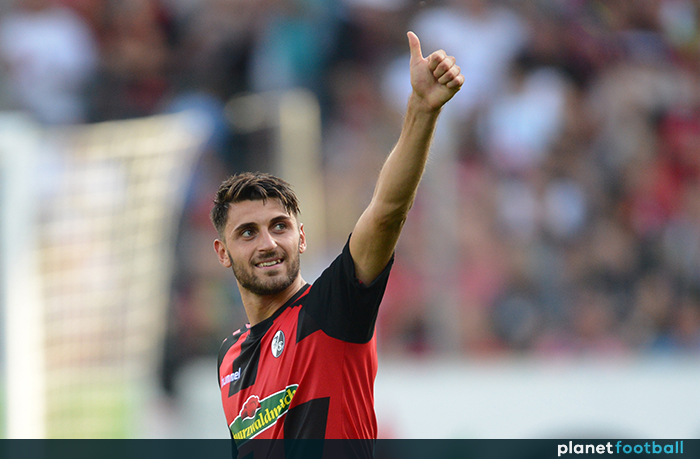Rising Stars: Why Thomas Tuchel had to sign Mahmoud Dahoud
“He’s incredibly good, I couldn’t let him get away.”
Mahmoud Dahoud was wanted by Jurgen Klopp at Liverpool and was linked with several other leading Premier League clubs, but Thomas Tuchel was not about to let that happen.
This summer, Dahoud will swap Borussia Mönchengladbach for Borussia Dortmund.
“With presence, vision and coolness on the ball, he dictated his side’s game.” That was Kicker’s assessment of Dahoud’s performance against Cologne earlier this month, but it could have been written after pretty much any game the 21-year-old has taken to the field.
Dahoud was man of the match in the Rhine derby, recording more touches (123) and making more passes (105) than any other player in a 3-2 win for Mönchengladbach. It’s what he does.
At times, Cologne simply couldn’t get a kick.
Gladbach would work the ball out to Thorgan Hazard on the left, before circulating it back via the centre to the advancing Nico Elvedi on the right.
Then, striker Raffael would drop deep to receive the ball. Or Lars Stindl would drift off his marker to receive a pass higher up.
No matter the direction of the pass, it always came from Dahoud, the 5ft 8in pivot controlling the midfield.
It was precisely the sort of performance which attracted interest from Liverpool, Tottenham, Chelsea and Manchester City last summer but which convinced Dortmund to keep Dahoud in the Bundesliga on a five-year deal at the Westfalenstadion.
Early years
Born in Amuda, Syria, a predominantly Kurdish town close to the Turkish border, Dahoud was taken to Germany in 1996 as his parents fled the Assad regime.
Growing up in the Rhineland, he spent a year in Fortuna Düsseldorf’s youth set-up in 2009 before switching to Mönchengladbach’s academy in 2010.
He was handed his professional debut by Lucien Favre in a 7-0 Europa League qualifying win over FK Sarajevo in August 2014 before becoming the first ever Syrian-born player to appear in the Bundesliga later that season.
But it wasn’t until Favre was replaced by U23 coach André Schubert after losing the first six games of the 2015-16 season that Dahoud became a key part of the Foals’ midfield alongside Granit Xhaka.
While Dahoud’s passing statistics stand out the most, it was his work rate which made him such an integral part of Gladbach’s midfield when he first came on the scene.
In the first half of his breakthrough 2015-16 season, he averaged 12.8km per match – the second highest in the Bundesliga. At home to Hoffenheim earlier this season, he notched up an impressive 13.1km. Against Cologne, it was a mere 11.95km.
“Mo’s got a real engine and is a willing runner, capable of running 12.5 to 13.5 kilometres per game,” Schubert told Kicker last year, though he cautioned that Dahoud has to make his running more efficient, adding: “He has to recognise that he doesn’t always have to run. He can ease off at times but that will come with experience.”
With his work rate carrying him all over the pitch, Dahoud is just as likely to contribute vital passes or shots on the edge of the opposition box as he is to find himself helping out deeper in his own half – where his energy can sometimes be more of a hindrance than a help. He’s not yet perfect.
Even during his man-of-the-match display against Cologne, he showed the danger of rushing too readily into tackles with a foul on the edge of his own box.
From the resulting free-kick, Anthony Modeste drew Cologne level for the second time in the match as Dahoud picking up a booking.
In this season’s Europa League last-16 second leg against Schalke, however, he demonstrated what he is capable of in the attacking third.
Midway through the first half, as Raffael led a counter-attack down the right-hand side, Dahoud quickly made up ground through the middle.
Picking the ball up 30 yards from goal, he moved the ball onto his favoured right foot and fired an unstoppable effort into the top corner.
It was a strike worthy of a European stage, which Gladbach were forced to exit after Schalke fought back to draw 2-2 and progress on away goals – the second of which came when Mark Clattenburg harshly adjudged Dahoud to have handled the ball in his own penalty area.
And with the Foals two points off the Bundesliga’s two Europa League places and in a five-way battle to qualify, there’s no guarantee they will be in Europe again next season.
So there were few arguments when the midfielder became sixth player to swap the Borussia of Mönchengladbach for the Borussia of Dortmund – the last one being a certain Marco Reus back in 2012.
“Mo has chosen Borussia Dortmund,” announced Gladbach’s sporting director Max Eberl at the end of March, as both clubs moved to quash the rumours from England.
“It was important to make this decision for both the player and the club so that we can all free our heads.”
Having already represented his adopted country at U18, U19, U20 and U21 level, the chance of catching national coach Joachim’s Löw’s eye before the 2018 World Cup was likely high on Dahoud’s list of reasons for choosing Dortmund over the Premier League.
Another reason is Dortmund coach Thomas Tuchel’s personal interest.
“We made enquiries about him last season,” revealed Tuchel in his first press conference after the deal was announced. “He’s incredibly good, I tried everything and I couldn’t let him get away.”
BVB’s sporting director Michael Zorc agreed, calling Dahoud “a highly talented and exciting player for our central midfield” – an area where Dahoud should prove to be an ideal fit in Dortmund’s passing game but where he faces stiff competition from the likes of Julian Weigl, Gonzalo Castro, Raphael Guerreiro, Nuri Sahin, Mario Götze and Shinji Kagawa.
“It’s a shame that such a talent is leaving us,” added Eberl, “but we have always managed to replace our departures.”
Indeed, Dahoud’s move can be seen as the logical next step in the Bundesliga food chain, where Bayern buy from Dortmund, Dortmund from Gladbach and Gladbach from those beneath them.
Freiburg’s Vincenzo Grifo and Hoffenheim’s Nadiem Amiri have already been touted as replacements.
Gladbach could also look to promote from within in the form of 19-year-old Slovakian talent László Bénes, who made an eye-catching debut alongside Dahoud against Hertha BSC earlier this month.
“László is a really good lad,” said Dahoud himself in a rare interview with BILD. “He definitely has what it takes to be my replacement.”
Until then though, Dahoud still has a job to do. Not only do his current team have five league games to secure European football, they also face Eintracht Frankfurt in the semi-final of DFB Pokal.
Win that, and Dahoud’s future team-mates could be waiting for him in Berlin.
By Matt Ford
More from Planet Football
Rising Stars: Kai Havertz, Bayer 04 Leverkusen’s 17-year-old wonderkid
Remembering Bayer Leverkusen’s incredible run of near misses
Away Days: Borussia Dortmund, James Bond & a dash of Cologne
The making of Leon Goretzka, the midfielder wanted by everyone



























